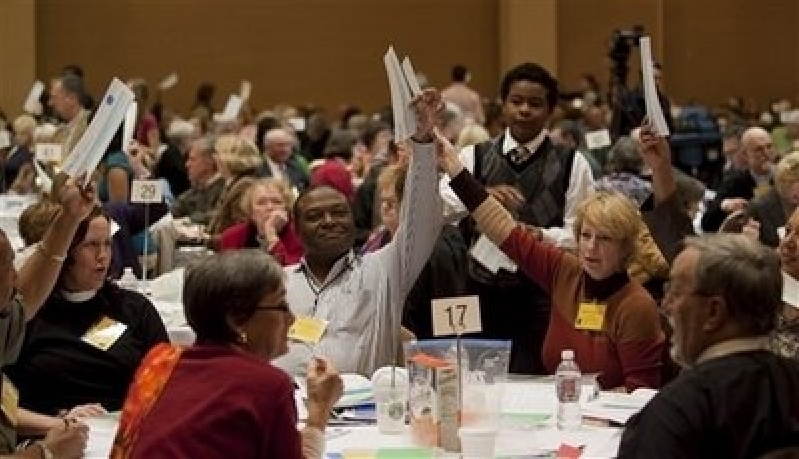
The Episcopal Diocese of Los Angeles has paved the way for an Annapolis, Md., woman to become the second openly gay bishop in The Episcopal Church and the worldwide Anglican Communion.
On Saturday, the Rev. Canon Mary Glasspool was elected to the office of bishop suffragan after the seventh round of voting gave her 153 clergy votes and 203 lay votes. The number of votes needed to win was 123 in the diocese’s clergy order and 193 in the lay order. The next closest candidate, the Rev. Irineo Martir Vasquez, had 87 clergy votes and 177 lay votes.
"I am very excited about the future of the whole Episcopal Church, and I see the Diocese of Los Angeles leading the way into that future,” said Glasspool after the final vote, according to the LA diocese’s news service.
“I look forward, in the coming months, to getting to know you all better, as together we build up the Body of Christ for the world," she added.
Following Glasspool’s election as the second of two suffragan bishops, Archbishop of Canterbury Dr. Rowan Williams, the spiritual head of the Anglican Communion, released a statement, saying that the election “raises very serious questions not just for the Episcopal Church and its place in the Anglican Communion, but for the Communion as a whole.”
Since the election of The Episcopal Church’s first openly gay bishop in 2003, relations between the U.S. Anglican arm and the rest of the worldwide Anglican Communion have been strained to the point of tearing.
While adherents of the Christian faith have historically taught that homosexuality is a sin according to Scripture, liberal believers say biblical teachings on inclusiveness should take precedence and nullify any such teachings against homosexuality.
Conservative Christians, meanwhile, hold onto the belief that homosexuals should not be allowed to hold positions of leadership within the Church. They also feel that the Church should not bless homosexual relationships, as this would be tantamount to blessing a sinful act.
Despite the strife that the row over homosexuality has caused, The Episcopal Church's top legislative body earlier this year approved a resolution declaring the denomination's ordination process open to all individuals, including practicing homosexuals.
Conservative bishops in the global Anglican fellowship say the move marks a clear break with the rest of the Anglican Communion and ignores their plea for a moratorium on consecrating practicing homosexuals as bishops. Episcopal Presiding Bishop Katharine Jefferts Schori, however, maintains that the resolution changes nothing and merely reaffirms what "church law has said for a long time."
Following Saturday’s vote at the 114th Annual Meeting of Diocesan Convention in Riverside, Calif., Archbishop Williams noted that the process of selection is only partly complete and that the election of Glassglow has to be confirmed by diocesan bishops and diocesan standing committees.
“That decision will have very important implications,” the Anglican leaders stated.
But Williams also noted that the bishops of the Anglican Communion have collectively acknowledged that “a period of gracious restraint in respect of actions which are contrary to the mind of the Communion is necessary if our bonds of mutual affection are to hold.”
According to the diocese’s spokesman, consents to the election of Glasspool by the bishops and standing committees of the Episcopal Church's other 108 dioceses must be received prior to the bishops-elect’s scheduled ordination to the episcopate, set for May 15, 2010.
As suffragan bishop, Glasspool would serve as an assistant to Bishop Diocesan J. Jon Bruno. Also awaiting consent is the Rev. Canon Diane Bruce, who was elected first out of the pool of six candidates nominated by a 24-member diocesan committee.
Bruce and Glasspool were the first and second women, respectively, to be elected a bishop in the LA diocese's 114-year history.







